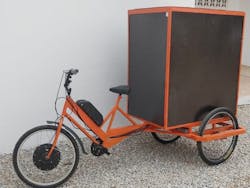Nigeria's First Indigenous eBikes Blaze a Path for Electrifying African Transit
ThinkBikes, a scrappy Nigerian startup, is aiming to kickstart the country's transition to electric transportation by manufacturing rugged, affordable eBikes using largely local materials and labor. Founded by Olugokun Tolulope, CEO of Think Electric Africa and a former a professor of engineering, the company serves the so-called micro-mobility market with locally manufactured two- and three-wheel pedal vehicles for last-mile transport of goods and people.
The company is currently tooling up to introduce the Alpha 1. It’s an electrified version of their rugged pedal truck, which provides users with greater speed, range, and cargo capacity.
Reducing Cost for the Consumer
Despite their many advantages, eBikes have had difficulty gaining mass market sales in most parts of Africa because the products being imported are too expensive for the average person. ThinkBikes believes it has solved this problem by manufacturing the conventional or electrified bike locally. This significantly reduces their cost, in part, by avoiding the heavy import taxes placed on most goods and materials.
To achieve these savings, more than 90% of Alpha 1's components, including the wheels and batteries, are locally sourced, with most of the imported content being the 1.5-kW (peak) motor and controller. The bikes' 1.68-kWh power packs are assembled locally using recycled 18650 cells. The detachable pack provides up to 100 km of driving when empty and 60 km when loaded.
This video, prepared for the final round of the Climate Launchpad competition, provides some additional details of ThinkBikes' business model, as well as the potential economic and environmental benefits of widespread adoption of eBikes in Africa.
According to Tolulope, local production enables ThinkBikes to sell vehicles that are optimized for use in Africa for 40% less than their imported counterparts. And since they cost only a fraction of what it takes to fuel and maintain a gasoline-powered vehicle, eBikes and eTrikes make it easier for merchants, medical workers, farmers, and tradespeople to deliver their goods and services.
Tolulope also says that local production boosts the local economy and helps build a community of people with the skills, resources, and networks necessary to manufacture larger electric vehicles or other complex products.
Leasing Options
But even at $1,000-$1,500, a commercial-grade electric ThinkBike would be beyond the reach of many Nigerian citizens and businesses. In response, the company is using a small grant from Siemens Stiftung to develop a short-term leasing program that will provide on-demand transportation for as low as $24/month. They’re also working on a business model that will allow people to buy the bikes without batteries (the most expensive component), and then lease or rent the packs from ThinkBikes.
To learn more about ThinkBikes and its unique business model, you can read the articles recently posted in Clean Technica and Energy Intelligence, or visit ThinkBikes at http://www.thinkbikes.com.ng/.
About the Author
Lee Goldberg
Contributing Editor
Lee Goldberg is a self-identified “Recovering Engineer,” Maker/Hacker, Green-Tech Maven, Aviator, Gadfly, and Geek Dad. He spent the first 18 years of his career helping design microprocessors, embedded systems, renewable energy applications, and the occasional interplanetary spacecraft. After trading his ‘scope and soldering iron for a keyboard and a second career as a tech journalist, he’s spent the next two decades at several print and online engineering publications.
Lee’s current focus is power electronics, especially the technologies involved with energy efficiency, energy management, and renewable energy. This dovetails with his coverage of sustainable technologies and various environmental and social issues within the engineering community that he began in 1996. Lee also covers 3D printers, open-source hardware, and other Maker/Hacker technologies.
Lee holds a BSEE in Electrical Engineering from Thomas Edison College, and participated in a colloquium on technology, society, and the environment at Goddard College’s Institute for Social Ecology. His book, “Green Electronics/Green Bottom Line - A Commonsense Guide To Environmentally Responsible Engineering and Management,” was published by Newnes Press.
Lee, his wife Catherine, and his daughter Anwyn currently reside in the outskirts of Princeton N.J., where they masquerade as a typical suburban family.
Lee also writes the regular PowerBites series.


